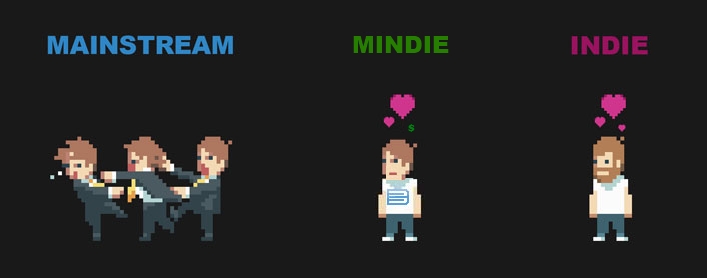Mindie – Bridging The Gap Between Mainstream And Indie
 I’m a mindie game developer and proud of it. But what does that mean? I’ve noticed a trend lately when it comes to indie developers. It seems to be all or nothing. You’re either Indie, with your beard and rebellious attitude or you’re mainstream with your suit and love of money. Why does it need to be so black and white? Am I the only person that wants to fit nicely in the middle, making deep and meaningful games that make a healthy profit? Can I be the bearded guy in a suit, or the clean shaven guy in a polo shirt? What’s wrong with wanting to be “mainstream indie”, or a “mindie” game developer?
I’m a mindie game developer and proud of it. But what does that mean? I’ve noticed a trend lately when it comes to indie developers. It seems to be all or nothing. You’re either Indie, with your beard and rebellious attitude or you’re mainstream with your suit and love of money. Why does it need to be so black and white? Am I the only person that wants to fit nicely in the middle, making deep and meaningful games that make a healthy profit? Can I be the bearded guy in a suit, or the clean shaven guy in a polo shirt? What’s wrong with wanting to be “mainstream indie”, or a “mindie” game developer?
Over the past few years the mainstream has moved further towards sequels, playing it safe and limiting creativity. It seems indie game developers are reacting to this by becoming “more indie”. A case in point is the IGF. Many of my indie friends complain that it’s impossible to win the IGF without making a controversial game that has no chance of making money. Surely we can find a middle ground between these two opposed views.
Let’s look at key parts of game development and see where Mindie developers fit into the mix compared to pure mainstream and indie developers.
Profits – Money is the root of all evil but the source of all Twinkie’s
Most indie developers I know don’t have the luxury of making games just for the love of it. At the end of the day, we all need money to live. Mindie developers are mindful of making a profit from their games but not at the expense of the game itself. The current landscape of game distribution is the perfect time for this lofty ideal. Digital distribution, micro-transactions and huge user bases on platforms like Facebook mean that we no longer have to make a boxed product that sinks or swims based on the first few months of sales. This gives Mindie developers the freedom to flex our creative muscles and then find a sales model that fits our product. There are many options to take opening up many more possibilities for game design and creativity.
Competition – Competition creates better products, alliances create better companies – Brian Graham
The general consensus is that indie developers don’t focus on their competition while mainstream developers are obsessed with them. Where does the Mindie game developer fit in? This time, we are closer to our indie roots. While it’s important to be aware of the competition and create something new and interesting, it should not drive development. Indie developers begin with their own ideas and creativity and adjust their plans based on competition. Mainstream developers begin with their competition and adjust their plans slightly to create their own game.
Publishers/Investors – Time is more valuable than money. You can get more money, but you cannot get more time – Jim Rohn
The traditional indie developer is defined by not having a publisher or large investor, hence the term “independent”. They are usually self-funded or take on small amounts of angel investment. The general consensus from mindie developers is that they would take on money, so long as it doesn’t water down their game. This is often shown by their realistic expectations of money required rather than the “more is better” attitude of most mainstream developers.
Project Size – It’s not the size of the dog in the fight, it’s the size of the fight in the dog – Mark Twain
Mainstream loves big, multi-million dollar games. Every year the cost keeps going up. Indie developers either through love, or more often than not, through necessity go for simple, small projects. Mindie developers need to find the middle ground again. Projects that are of a substantial size that they can make a profit while keeping development costs low at all levels of development. From team sizes to feature lists, they focus on finding the fun with the least possible features.
Art – If you think a game is ‘Madden 2008,’ then hey, games probably aren’t art – Jonathan Blow
Many indie developers make art. Mainstream developers are skilled in the art of spending copious amounts of money making a game that is 10% better than the previous game or competitor. Mindie developers are pragmatic. They focus on making a fun, deep game and letting everyone else decide whether it’s art. Pragmatism over pretentiousism*.
*Yes that’s not really a word, but neither is Mindie
Conclusion
So that’s my attempt to bring some unity between the mainstream and indie developers. I look forward to seeing what the coming years bring for mindie’s and particularly in Australia where the collapse of the mainstream game development industry has left most of my friends turning indie in hopes of fame and fortune (or at least recognition and Twinkies).
What do you define as a mindie and are you one?
 I build software. The best place to find me is on
I build software. The best place to find me is on